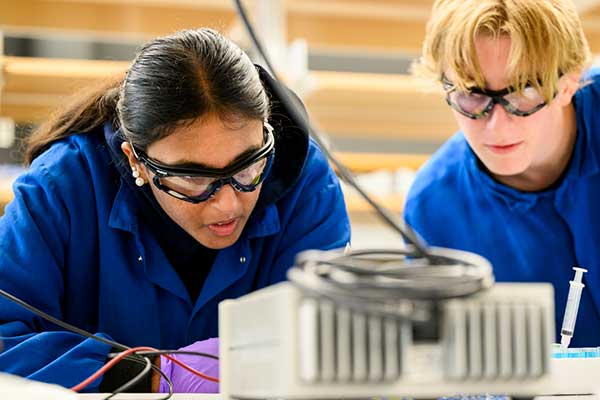Young Scholars Program Offers Incredible Opportunities for High School Students

The Young Scholars Program, offered by the Michael B. Silevitch and Claire J. Duggan Center for STEM Education, allows rising high school seniors to participate in a six-week program to gain hands-on experience in the world of science, technology, engineering and mathematics.
This article originally appeared on Northeastern Global News. It was published by Alena Kuzub. Main Photo: Shiza Hussain, 17, from Foxborough High School in Massachusetts, and Kian Nhuch, 17, from Somerville High School, conduct research at Northeastern. Photo: Matthew Modoono, Northeastern University.
Northeastern summer program inspires future STEM leaders through research and mentorship
Shiza Hussain, a 17-year-old rising senior at Foxborough High School in Massachusetts, has long been drawn to the sciences and the challenges of climate change and water sustainability.
While taking advanced placement courses in physics and biology, she also dedicated her free time to advocating for public policies that address climate change.
This summer, participating in Northeastern University’s six-week Young Scholars Program, she discovered she can unite her academic interests with her passion for climate change in a future career.
“I can see myself here pursuing what I enjoy,” Hussain says.
The Young Scholars Program — offered free to Boston-area rising high school seniors interested in science, technology, engineering and mathematics — provides a rare opportunity for a hands-on academic research experience before college.
This year, Northeastern’s Center for STEM Education received an unprecedented number of applications — over 350 — and invited 32 students to participate in the program.
A launchpad for future scientists and engineers
The Michael B. Silevitch and Claire J. Duggan Center for STEM Education launched the Young Scholars Program in 1990 in response to a nationwide shortage of domestic students entering the sciences, math and engineering fields.
During the program, participants work in state-of-the-art laboratories on Northeastern’s Boston campus, attend faculty-led seminars and visit local organizations to see STEM in action.
“They’re a half-step away from going away to college,” says Claire Duggan, the center’s executive director. “So, this experience really does help them make that transition and make informed decisions.”
Beyond research, students take on fun engineering challenges, such as building an air-powered rocket, while developing skills and friendships. They also receive guidance on the college application process, professional development and many career pathways in STEM.
Faculty and student mentors
Over the years, many faculty members, graduate students and postdocs, Duggan says, have volunteered their time to host high school students in their labs.
“This is an opportunity for them to be able to explain difficult science concepts to younger audiences and to develop mentoring skills,” she says.
One of those mentors, Marvin Onabajo, professor of electrical and computer engineering at Northeastern, says he enjoys working with high school interns because they are highly motivated and bring fresh perspective to the research.
His lab specializes in analog and mixed-signal integrated circuit designs, or tiny electronic chips that combine both analog and digital signals and can be used in wireless communication or medical devices. Young Scholars in his lab typically design printed circuit boards, flat boards that connect electronic components with thin metal paths, and program microcontrollers to test their prototypes.
“The questions that they ask force you to think a little bit outside of your technical expertise in order to come up with general explanations, like for a broader audience,” he says.
Northeastern student facilitators, Duggan says, are also critical to the program’s success. They support scholars throughout the program, ensure everything runs smoothly in each lab and help coordinate faculty speakers.
Read full story at Northeastern Global News